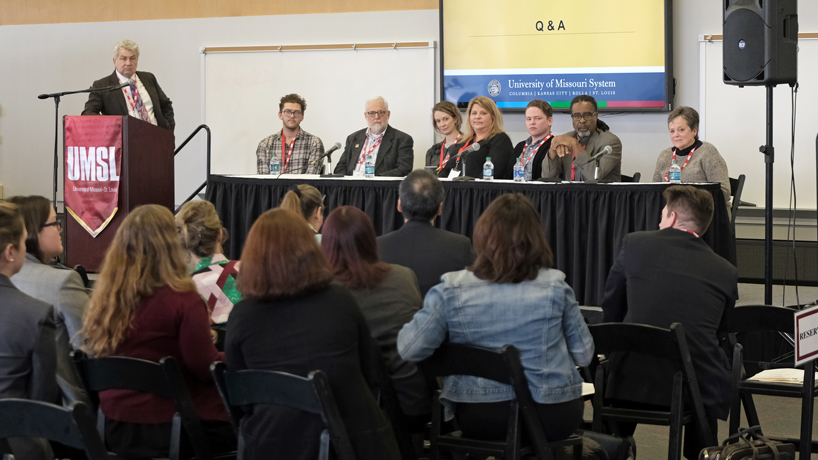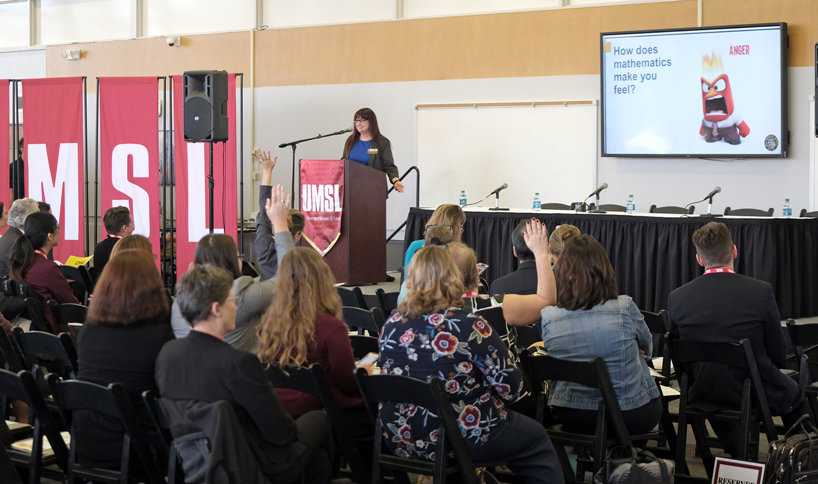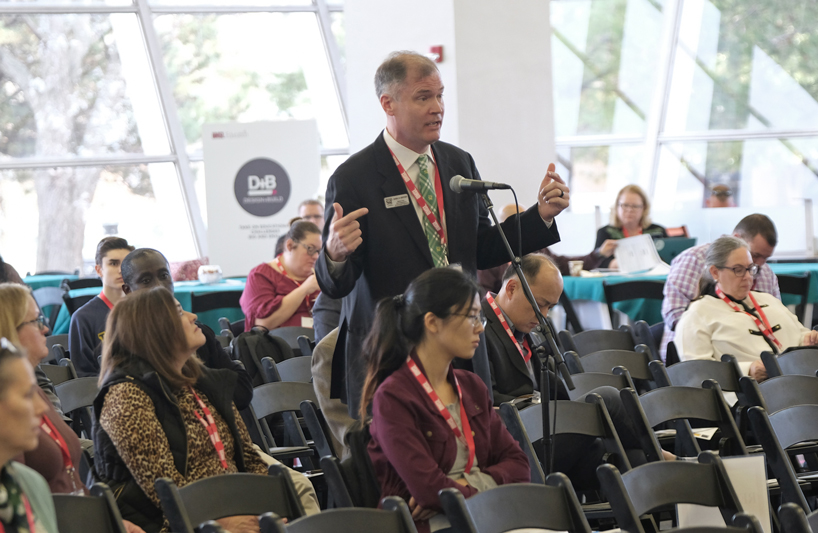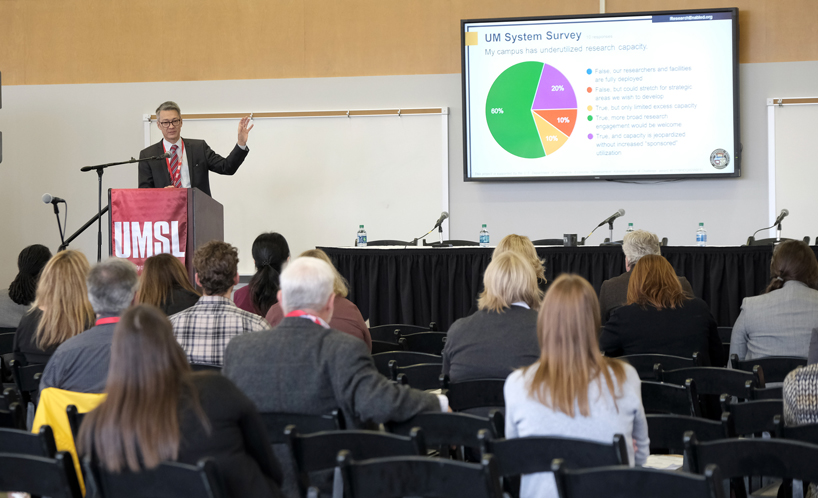
Panelists listen intently to a question from the audience during the third session of last Wednesday’s UM System Research Summit titled “Converging Disciplines to Support Sustainable Development Goals,” held at the Ed Collabitat on UMSL’s South Campus. (Photos by August Jennewein)
Members of the United Nations voted in 2015 to adopt a blueprint for sustainable development with 17 goals they planned to meet by 2030.
Among them were an end to poverty and hunger, promoting good health and well-being, ensuring quality education and gender equality and providing clean water and hygiene and access to affordable, renewable energy.
Faculty members from a variety of disciplines across the University of Missouri System’s four universities have been conducting research aimed at helping society meet many those broader goals.
Last Wednesday, 21 of them shared their work in a series of eight-minute presentations during a research summit themed “Converging Disciplines to Support Sustainable Development Goals” held at the University of Missouri–St. Louis. Chris Spilling, UMSL’s vice provost for research, credited Nicolle Von Der Heyde, a lecturer and PhD candidate in the College of Education, for coming up with that concept.
“These summits have served a very useful purpose, to elevate the discussion for collaborative research across the four universities,” UM System President Mun Choi said while welcoming attendees to the Ed Collabitat on South Campus. “Even though each presentation is short in time, they create a lot of interest among the faculty members and other participants to think about how the links to their own research can be met.”
In her welcoming remarks, UMSL Interim Chancellor and Provost Kristin Sobolik noted the importance of the challenges Wednesday’s presenters were trying to solve.
“These are global goals that we’re all working on collectively – goals that will, if achieved, impact not only Missouri but, of course, the rest of the world,” Sobolik said. “These SDGs are a universal call to action to end poverty, protect the planet and ensure all people enjoy peace and prosperity. I can’t think of better goals to showcase what we do here at the University of Missouri, across the entire system.”
Amber Candela, an assistant professor in UMSL’s College of Education, polls the audience on their feelings about learning mathematics. Her presentation centered on ways to help students find joy in a subject that often gives them anxiety.
The morning’s first session focused on education with presentations from UMSL College of Education faculty members Shea Kerkhoff, Jennifer Bumble and Amber Candela sharing their work along with Beth Kania-Gosche, the founding chair of the Department of Teacher Education and Certification at Missouri University of Science and Technology.
Kerkhoff discussed the need to teach global citizenship everywhere. Bumble described ways to engage communities with a goal of greater inclusivity for people with disabilities. Kania-Gosche shared stories about the challenges teachers face teaching in rural areas, where they’re often dramatically underpaid.
Candela went last and presented on what she jokingly called “everyone’s favorite subject”: math.
“I want to start off this morning with a little survey,” she said, asking for a show of hands. “For how many people does mathematics give you fear? What about disgust? Sadness? Anger?”
When she finally came to the last category – joy – only a few hands were raised among the more than 50 people in the room.
“What I’m trying to understand is how are we can bring more students to experience joy and curiosity in mathematics,” Candela said and offered some ideas to change the tasks teachers give students – tasks that too often leave students confused or don’t provide enough opportunities to actively participate.
Wednesday’s second session featured a series of presentations aimed at creating a more sustainable environment, including Missouri S&T faculty members Paul Nam and Jonghyun Park discussing biomass conversion technologies for sustainable bioenergy and advancements in battery technology, respectively. UMSL Assistant Professor of Computer Science Sharlee Climer shared insight on how to work with big data.
Missouri S&T Professor Daniel Oerther asks a question of the day’s first panel at the UM System Research Summit. Oerther later presented on the importance of improving water, sanitation and hygiene to address stunting in many underdeveloped countries.
The session started with Daniel Oerther – a Missouri S&T professor of civil, architectural and environmental engineering – describing his work on improving water, sanitation and hygiene to combat the problem of stunting that plagues many undeveloped countries. He showed a picture of 9-year-old children in Guatemala, where stunting has hit indigenous people particularly hard.
“Because they have unclean food and unclean water, they have unhealthy intestines, this is causing them to be stunted,” Oerther said.
Presenters in Wednesday afternoon’s two sessions included Patricia Parker, UMSL’s E. Desmond Lee Professor in Zoological Studies, on the work of the Whitney R. Harris World Ecology Center to build human capacity to protect biodiversity and University of Missouri–Kansas City’s Associate Professor of Economics Linwood F. Tauheed on the framing of issues impacting ecological economics, including decisions about using or not using natural resources.
Attendees also heard from faculty members in social work, psychology and health sciences, including the University of Missouri–Columbia’s Kathleen Preble discussing work to eliminate human trafficking, UMSL’s Shirley Porterfield on helping young people with disabilities with medical access and food insecurity and MU’s Loren Bauerband on the importance of accurate subgroup identification for understanding the health needs of transgender people.
Lara Zwarun, associate professor of communication and media at UMSL, talked about why communication is so important to promoting sustainability in a world in which people are overloaded with information.
“Scientists and environmentalists need to think and act more like marketers,” Zwarun said. “We need to make our actions and our beliefs palatable in less substantive ways. We need to sell our efforts.”
Research Enabled
Wednesday’s program also featured a special presentation from UMSL staff members Tamara Wilgers and Jay De Long about Research Enabled, a new online portal designed to connect university researchers with industry-sponsored projects, service contract opportunities and potential collaborators. Wilgers is the director of technology commercialization and economic development. De Long, hired in April, serves as the Research Enabled director.
Director Jay De Long discusses Research Enabled, a new online portal designed to connect university researchers with industry-sponsored projects. The portal was created with a grant from the U.S. Department of Commerce.
The portal is a joint initiative of the UM System and the Southern Illinois University System created with a U.S. Department of Commerce grant of $692,144 awarded last year.
Members of industry will have the opportunity to come forward with their business challenges and receive proposals from university researchers trying to meet them. They’ll also be able to search investigator-initiated projects proposed by faculty members and determine if they are initiatives they’d like to support.
“For the university, it brings new industry sponsors to bear, we hope,” De Long said. “It proposes new directions in research that these industries would put forward for you to explore. They can find your projects. They can quickly match up with resources across the University of Missouri System and Southern Illinois University, and we hope over time to include other research institutions to our pool of researchers, making it more valuable for industry to come to us.”
Researchers last week could start opting in to be part of the portal, claiming and updating their individual researcher profiles. The first industry challenges are scheduled to be added to the portal on Dec. 15 with a public launch planned for February.

















